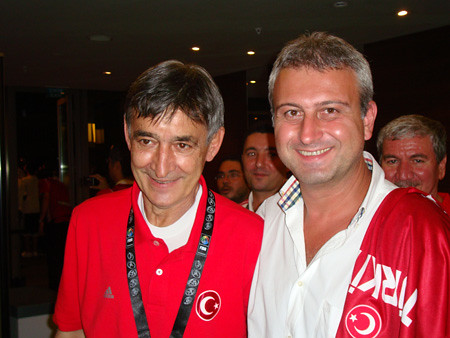In the annals of European basketball, few names resonate with the same blend of tactical genius, unconventional wisdom, and sheer audacity as Bogdan Tanjevic. The Montenegrin-Italian coach, a true citizen of the world, orchestrated one of Italy`s most improbable triumphs: the 1999 EuroBasket gold. Now, from the tranquil vantage point of his Trieste home, Tanjevic reflects on a life lived on the sidelines, where bold decisions forged champions and an unyielding commitment to collective spirit triumphed over individual glory.
The Pozzecco Paradox: A Defining Decision
The journey to European supremacy in 1999 was anything but smooth, famously commencing with a decision that many deemed scandalous. Tanjevic chose to exclude Gianmarco Pozzecco, the undisputed star of Serie A and the architect of Varese’s unexpected championship title. It was a move that sent ripples of disbelief through Italian basketball circles.
“My decision to exclude Poz was a minor scandal,” Tanjevic recalls with a wry smile. “He was the absolute protagonist of Serie A, a star. He was a player I liked: courageous, fast, technically diverse. But he was not the playmaker that team needed to control the game. For him, a different type of play was necessary; I would have had to rebuild the team in his image. And that simply wouldn`t work.”
This candid admission reveals the core of Tanjevic`s philosophy: a team is not merely a collection of stars, but a finely tuned symphony where each instrument plays its part in harmony. Pozzecco, for all his brilliance, represented a discordant note in Tanjevic’s carefully composed masterpiece. The move, though controversial, underscored Tanjevic’s unwavering belief in his vision, free from the shackles of public opinion or individual accolades.
The “Ego Discount”: Forging a Collective Will
The team, initially riddled with skepticism and a disheartening loss to Croatia, found its footing by embracing Tanjevic`s unique brand of leadership. His mantra was simple, yet profoundly challenging: ask for an “ego discount” from each player. This meant convincing formidable talents like Carlton Myers, a phenomenal scorer, to dedicate himself equally to defense. Tanjevic`s ability to make every player feel like a winner, regardless of their role, transformed skepticism into solidarity.
The journey was arduous. After a stunning defeat to Lithuania, the Azzurri faced formidable opponents like Russia and then the basketball juggernaut of Yugoslavia. Yet, something shifted. “From the quarterfinals against Russia onwards, everything went well; the team solidified,” Tanjevic notes. They vanquished Yugoslavia – a feat of immense psychological significance, having previously won 8 out of 9 encounters against the formidable Balkan side – and then Spain in the final. This newfound confidence, stripped of doubt, allowed them to play with a rare tranquility, culminating in gold.
The Intellectual on the Bench: Beyond X`s and O`s
Tanjevic is often dubbed an “intellectual of the bench,” a label he readily embraces. His passion extends beyond the basketball court, deeply rooted in literature and academic study. He believes this broad perspective is crucial for understanding the complex human element of coaching.
“It`s about entering the lives of others,” he explains. “If you can think like another, understand their desires, needs, and fears, then you can lighten their burden, taking their fears upon your own shoulders. Encouragement becomes more natural when you know many lives and many destinies. It all starts from sincerity.”
This empathetic, yet firm, approach allowed him to connect with players on a deeper level, fostering an environment of trust and mutual respect. He famously told his players: “Don`t hide behind me.” He rejected the notion of “taking responsibility” as a burden, instead encouraging immediate action. “Shoot the ball! There`s nothing to wait for,” he would urge, liberating them from the paralyzing fear of failure. He even “forbade them from reading newspapers” to shield them from external pressures.
A Legacy Etched in Resilience and Courage
From his early days as a 17-year-old playmaker thrown into the first team, Tanjevic learned the value of opportunity and trust. He carried this lesson forward, courageously backing young talent. “Why couldn`t I do the same with my players, believing they could be good?” he muses.
His career spanned legendary Italian clubs like Caserta, Trieste, and Stefanel Milano, where he yearned to replicate the “miracle” of Bosna Sarajevo – winning with unknown players. He came agonizingly close, often using the evocative metaphor of “Omaha Beach” for major matchups, seeing them as decisive landings in enemy territory.
Even today, Tanjevic remains keenly observant of the sport. He sees promise in the current Italian national team, noting “new faces with important roles” and highlighting young talents like Niang and Diouf. His admiration for basketball legends remains undimmed, particularly for Dino Meneghin, whom he coached for three years. “An pride greater than this cannot be!” he exclaims, praising Meneghin`s integrity, modesty, and honesty, suggesting he would make a “fantastic President of the Republic.”
Bogdan Tanjevic`s story is a testament to the power of unwavering conviction, intelligent leadership, and a deep understanding of human nature. He didn`t just coach basketball; he shaped characters, built teams out of diverse individuals, and left an indelible mark on a nation`s sporting heart, proving that true leadership often requires the courage to make the most difficult choices, and then stand by them, come what may.

